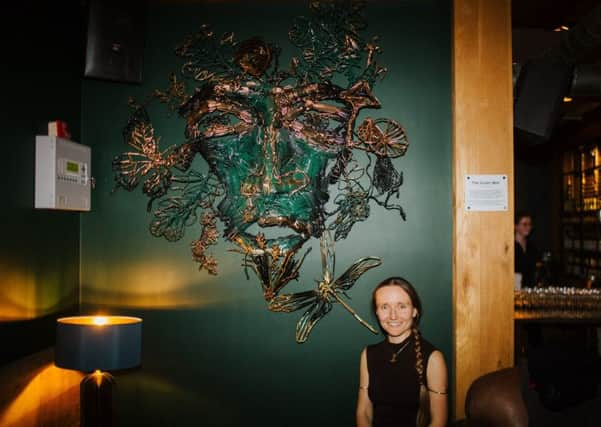Thousands of plastic straws used to create sculpture marking 10th birthday of popular Tring pub


One of Tring’s favourite pubs, The Akeman, will be celebrating its tenth birthday this month as the first of what has now become a major force in the Pub Industry, Oakman Inns.
The Akeman recently underwent a major refurbishment and an extension into the shop next door providing a new wood-fired pizza oven in the extended open kitchen, more seating in the enlarged restaurant and two cosy ‘parlour rooms’ with a dedicated servery - which have all received many favourable and admiring comments from their regulars.
Advertisement
Advertisement
One change has been the display of a large and unusual wall sculpture of a giant Green Man, commissioned by Oakman’s CEO, Peter Borg-Neal, which is made from tens of thousands of plastic straws.
A Green Man is a sculpture or other representation of a face surrounded by leaves, branches or vines. It was originally known as a Foliate Head and was commonly used as a decorative architectural ornament. Green Men are frequently found in carvings on both secular and ecclesiastical buildings, and in 1939 inspired Julia, Lady Raglan to produce a paper “The Green Man in Church Architecture” where the term “Green Man” was first used, later to become the preferred label. Prior to that, green forested figures came with a variety of names and formed a variety of European cultures. Lady Raglan’s work was invaluable in establishing the Green Man as a legitimate object of historical and anthropological study.
Peter Borg-Neal’s commission was prompted by seeing evidence of the appalling and direct impact of discarded straws on so many sea creatures, and he decided to ban single-use plastic drinking straws from all 20 of their pubs to mark Earth Day 2017 (22nd April). However, this meant he had a stockpile of over 60,000 unwanted plastic straws – which he could hardly throw away!
Peter said: “We take sustainability seriously in our business, and having seen a tragic video of a turtle with a straw embedded deep in its nose, we became the first pub group to #BanTheStraw in the UK, which has inspired other pub groups to follow suit. Sending our stock of plastic straws to landfill was not an option so we decided to find an artist to refashion them into a sculpture that epitomised Oakman Inns’ culture.”
Advertisement
Advertisement
Ipswich sculptor, Lois Cordelia, was commissioned to design and create a wall-mounted sculpture which incorporates several tens of thousands of the unwanted plastic straws, threaded, woven and bunched together on a sturdy frame of steel wire.
Lois said: “It was a privilege to work with Oakman Inns on such an unusual and pioneering brief, which came to me through the innovative MyArtBrief website. From my initial thoughts of creating a giant Oak tree out of the straws, the Green Man evolved to incorporate not only oak leaves but many other distinctive elements of native British fauna and flora. People’s response to this creative “upcycling” has been overwhelmingly positive.”
The Green Man theme is intrinsically linked with Oakman Inns and its name. According to some sources the first recorded use of “Ake Man” suggests that the name was a personal or even a nickname for a hard man, one as strong as oak. The surname as Oakman or Okman was occupational for a forester or perhaps a charcoal maker.
The arboreal theme continues throughout the group, as Oakman also owns The Akeman Inn in Kingswood, near Bicester and the soon-to-be redeveloped Royal Foresters in Ascot. The company also owns four Beech Houses, designed to be relaxed casual dining and drinking pubs and The Cherry Tree in Olney, which opens next Spring after its conversion from a Care Home.
Advertisement
Advertisement
The Akeman in Tring is not only the first pub in the widely acclaimed group, but is also managed by Peter Borg-Neal’s son, Éamonn, who started work in the pub as a kitchen porter a 16 years old when it first opened ten years ago. Peter added: “I started working in the pub trade in exactly the same way. You have to start at the bottom and if you run your own business, you have to know and understand how to do every job. I am so proud of Eamonn and where he is today.”